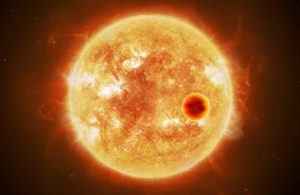ESA’s next science mission to focus on nature of exoplanets

ARIEL, the Atmospheric Remote‐sensing Infrared Exoplanet Large‐survey mission, was selected by ESA today as part of its Cosmic Vision plan.
The mission addresses one of the key themes of Cosmic Vision: What are the conditions for planet formation and the emergence of life?
Thousands of exoplanets have already been discovered with a huge range of masses, sizes and orbits, but there is no apparent pattern linking these characteristics to the nature of the parent star. In particular, there is a gap in our knowledge of how the planet’s chemistry is linked to the environment where it formed, or whether the type of host star drives the physics and chemistry of the planet’s evolution.
ARIEL will address fundamental questions on what exoplanets are made of and how planetary systems form and evolve by investigating the atmospheres of hundreds of planets orbiting different types of stars, enabling the diversity of properties of both individual planets as well as within populations to be assessed.
Observations of these worlds will give insights into the early stages of planetary and atmospheric formation, and their subsequent evolution, in turn contributing to put our own Solar System in context.
The selection of the mission was also supported by the Czech delegation headed by the Ministry of Education, Youth and Sports. The team of scientists from the J. Heyrovsky Institute of Physical Chemistry of the CAS is involved in the preparation of the mission. Czech Republic is now directly involved in projects of space research and in the area of exoplanets, which has not participated directly in the Czech workplace. The selection of the ARIEL mission opens up a number of new opportunities for both other Czech research organizations and businesses.